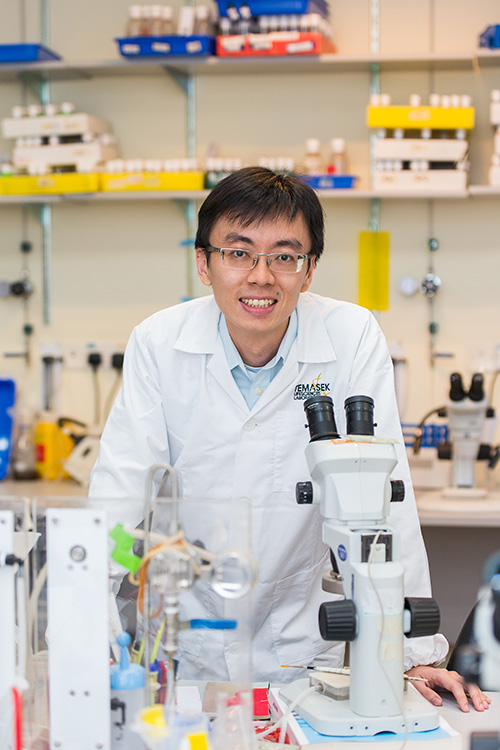
Impact
Jun Wei hopes to improve the health of future generations. His work aims to enhance the reproductive health of parents to ensure the well-being of their children and beyond.
Aging, poor mental and metabolic health are problems faced by many countries including Singapore. Epidemiological studies have shown that parental mental and metabolic states can be passed down to the next generations, however the mechanisms of inheritance are unclear. Jun Wei has been studying the molecular and cellular mechanisms of transgenerational epigenetic inheritance via the gametes in fruit flies Drosophila. To date, his lab has discovered the roles of RNA molecules in mediating transgenerational inheritance in response to dietary changes.
Jun Wei is now collaborating with clinicians and nutritionists to figure out ways to combat reproductive aging and safeguard well-being of the next generation by improving the metabolic health of parents. For example, mothers’ milk bioactive components and cells can have a long-lasting impact on offspring growth and development. Improving offspring health could also be done through pre-conception intervention in parents and understanding the mechanisms of epigenetic inheritance. By combining research in population health and animal models, Jun Wei hopes to find ways to combat reproductive aging through identifying mechanisms and biomarkers for oocyte aging.
Collaborations, Achievements & Honours
- Collaborating with KK Women and Children’s Hospital (KKH) and A*STAR Singapore on improving the metabolic and reproductive health of parents and development of offspring.
- Collaborating with National University Hospital (NUH) Singapore on implementing treatments for reproductive aging.
- Discovered a new class of RNA molecules and mechanisms in mediating transgenerational inheritance.
- Uncovered a role for fasting in mitochondrial quality control to improve oocyte health.
- Identified a genetic compensation pathway in safeguarding translation during spermatogenesis.
- Howard Hughes Medical Institute Fellow, Life Sciences Research Foundation (2013).
- SCSS – Dr. Susan Lim Award for Outstanding Young Investigator (2024).
Research Areas
Developmental Biology, Genetics & Genomics, Reproductive Biology & Transgenerational Inheritance
Affiliations
- Principal Investigator, TLL
- Adjunct Assistant Professor, Department of Biological Sciences, NUS
- Editorial Board Member, Communications Biology Journal (Genetics & Development)
Question
How do we address problems in obesity and aging with lifestyle and dietary interventions that affect egg and sperm cells, eventually impacting offspring development and health?
Approach
Reproduction involves making quality gametes. Egg and sperm are essential for the continuity of a species and have huge implications for human health. The quality of gametes is not only important for successful fertilization and embryonic development, it also influences the health and well-being of the offspring. Thus, the process of oogenesis and spermatogenesis are carefully controlled by quality control mechanisms, and heavily influenced by factors such as aging, metabolic states, DNA integrity and temperature.
To date, Jun Wei’s lab is deepening studies by working closely with clinicians and scientists to push forward the understanding of reproduction and its impact on offspring – both in animal models and human epidemiological studies. Jun Wei is particularly interested in molecular and cellular mechanisms of biological and environmental stressors that affect gamete formation and offspring health.
The lab is currently focused on the functions of regulatory RNAs in gene expression, organelle and protein homeostasis. The lab has discovered many sisRNAs in Drosophila and shown that sisRNAs engage in regulatory feedback loops, which play important roles in ovarian stem cell homeostasis, oocyte quality and offspring development. These discoveries provide the basis to uncover new mechanistic insights into evidence-based interventions that improve reproduction and ensure the well-being of future generations.
Bio
Pek Jun Wei received his Bachelor of Sciences (Honours) and Doctor of Philosophy from the National University of Singapore (NUS) in 2011. His graduate research focused on the roles of nuage and small RNAs in the Drosophila germline, in the lab of Dr Toshie Kai at TLL. This was followed by a postdoctoral training at the Carnegie Institution for Science (Department of Embryology), where he began to explore a novel class of stable intronic sequence RNAs, or sisRNAs in Drosophila, in the lab of Dr Joseph Gall and Dr Allan Spradling as a Carnegie Collaborative Fellow. Jun Wei was later named a Howard Hughes Medical Institute (HHMI) Fellow of the Life Sciences Research Foundation and awarded a fellowship from the Jane Coffin Childs Memorial Fund. In 2014, he returned to TLL as a Young Investigator to start his independent research group on the molecular and biological functions of sisRNAs.
Principal Investigator
Pek Jun Wei
The lab studies the biological mechanisms of reproduction and intergenerational inheritance, and how they can affect human health.
Current Vacancies
-
Dr Pek Jun Wei Group: Research Officer/Postdoctoral Fellow
16 October 2024
Group Publications
-
The idiosyncrasies of oocytes
Pek JW.4 April 2025 -
Investigating male factors and their relationships with reproductive health outcomes: a case-control study protocol for Towards Optimal Fertility, Fathering, and Fatherhood studY (TOFFFY) in Singapore
Ku CW, Pek JW, Cheung YB, Durgahshree MT, Chan M, Lee YH, Godfrey KM, Yap F, Chan JKY, Loy SL.17 January 2025 -
Can stable introns and noncoding RNAs be harnessed to improve health through activation of mitohormesis?
Chan SN and Pek JW.24 October 2024 -
The birth of stable introns
Pek JW.28 June 2023 -
Distinct biogenesis pathways may have led to functional divergence of the human and Drosophila Arglu1 sisRNA
Chan SN and Pek JW.6 February 2023 -
A guide to naming eukaryotic circular RNAs
Chen LL, Bindereif A, Bozzoni I, Chang HY, Matera G, Gorospe M, Hansen TB, Kjems J, Ma X-K, Pek JW, Rajewsky N, Salzman J, Wilusz JE, Yang L and Zhao F.31 January 2023 -
Passing down maternal dietary memories through lncRNAs
Koh XY and Pek JW.24 January 2023
